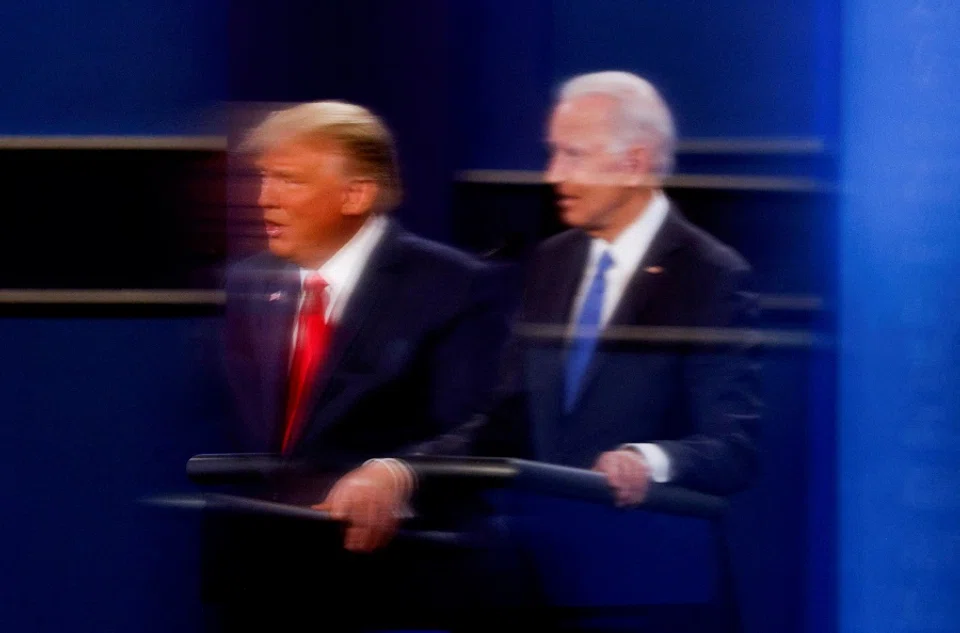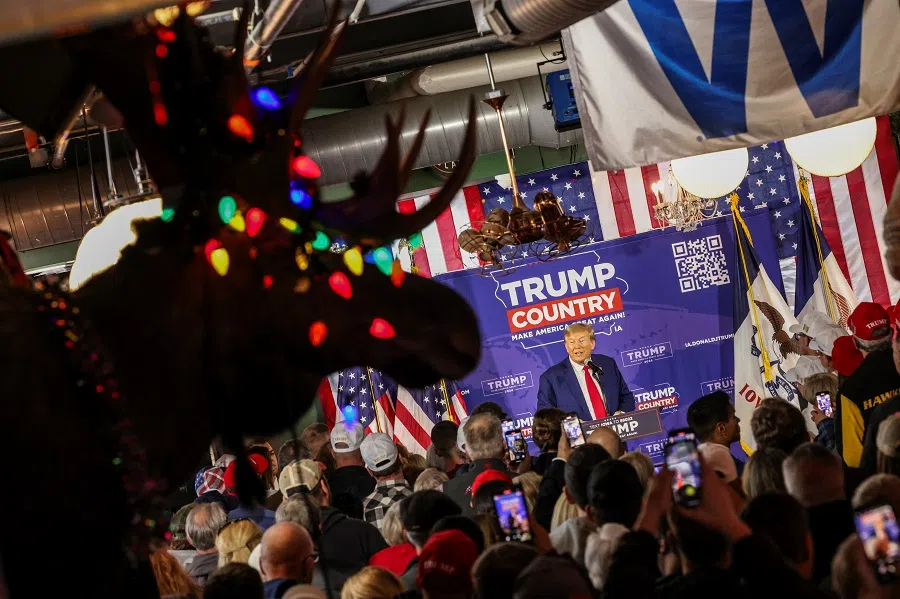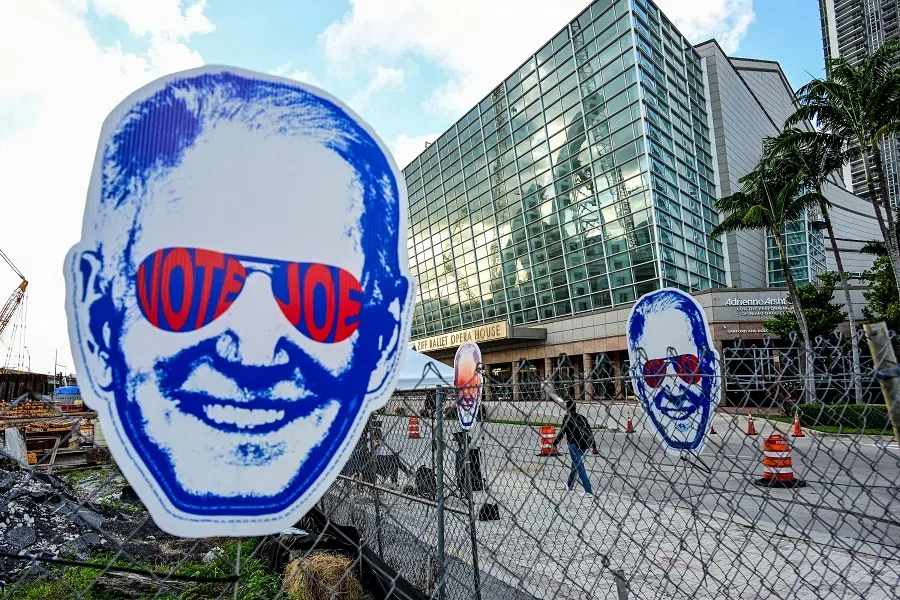'Old' and messy, but US-style democracy and elections still the way to go
With the next US presidential election coming up in 2024, academic Fei-Ling Wang says that democracy is not a natural state of affairs as opposed to authoritarian rule, which is in fact what humans gravitate towards. However, democracy seems to be the least "evil" among all the various governance systems.

The curtains have gone up on the next US elections, with the primaries deciding each party's candidate kicking off in Iowa on 15 January 2024.
The marathon to decide the leader of the world's superpower has always made the news. Much ink has already been spilled over this; countless pundits, academics and journalists from various countries have weighed in on the issue. And with so many people watching, there will be both praise and criticism.
Proponents of the US call the elections an exemplar of democratic politics that mark the zenith of humanity's political governance with peaceful power transition for more than 230 years. Opponents of the US often point to the enormous costs involved and how it divides society, when the exercise is in merely a periodical reallocation of power among a small group of elites.
As a part of US-style democratic politics, the electoral system is far from perfect. In fact, democratic politics itself might not be natural or perfect. Historical studies on political science and psychology have long found that in communal living and political governance, all human groups have a deep-rooted authoritarian or oligarchical tendency, and this cultural complex is the long internalisation of a tribal family civilisation. In human history, autocracy has always been the norm - it is the most common and longstanding political system.
Yet traditional autocratic dictatorship is at best a suboptimal system, peaking in the Chinese world during the Qin and Han dynasties with its Confucian legalist imperial system.
From tyranny to democracy
Thanks to French Enlightenment luminary Voltaire, one Western saying goes that the most ideal form of human governance is a "benevolent tyranny", which needs to be "tempered by an occasional assassination [of dictators]".
Of course, leaders would not want to be occasionally decapitated, which is why even the most benevolent or rational dictator would inevitably engage in tyranny for tyranny's sake, to protect their life and hold on to the thrill of power; the degree of benevolence and rationalism is generally inversely proportional to the length of rule.
Systems such as hereditary monarchy and imperial examinations have slightly eased the tough issues of succession and talent selection in authoritarian politics. Yet traditional autocratic dictatorship is at best a suboptimal system, peaking in the Chinese world during the Qin and Han dynasties with its Confucian legalist imperial system.
Since ancient times, innovators have tried anti-authoritarian democratic politics, such as in ancient Athens. Modern democratic politics originated in Europe and America, just a few centuries ago.
This rather "unnatural" and even somewhat "accidental" and "hapless" system of compromise has lasted until now, supporting the industrial and technological revolutions. More progress has been made in the last two or three centuries in terms of population, life expectancy, quality of life and human rights than in the preceding hundreds of millennia, and democracy gained a "universal" name. Some authoritarian regimes even use "democratic" in their country names, ironically calling attention to what they lack.

For people with an "authoritarian complex", democracy often seems rather unsympathetic, slow and arduous. For those in charge who have had a taste of power, democratic politics is even more cumbersome. Former British Prime Minister Winston Churchill once called democracy the "worst form of government"; but wise as he was, he followed that up with an important line - "except for all those other forms that have been tried from time to time..."
Not all democracies are the same - even within Western democracies, some may adopt constitutional monarchy, parliamentary democracy or a presidential system.
Democracy and the rule of law requires competitive elections, but having elections does not necessarily mean that there is true democracy and the rule of law.
Elections, democracy and the rule of law
The common essence of modern democracies lies in the stable and effective implementation of the rule of law, that is, no man is above the law. It is not just about rule by law, where the governing authority is above the law; and certainly not the rule of man, where a society is arbitrarily ruled by one regime.
On the other hand, elections are necessary to peacefully replace and constrain lawmakers and law enforcers. They are also an important mechanism for making decisions and adjustments regarding the use of public power, the definition of rights and the allocation of resources. Elections are not a sufficient condition for democracy and the rule of law, but are a necessary tool for their implementation. Democracy and the rule of law requires competitive elections, but having elections does not necessarily mean that there is true democracy and the rule of law.
As for voting systems, there have been all kinds throughout history, and it all boils down to which is the "least terrible". Fair universal suffrage is certainly good; even limited but competitive elections among elites can effectively achieve democracy and the rule of law.

US elections have a long history and huge impact. Because of its age, a thick layer of old practices has built up; because of its importance, it is difficult to change. Now, it has become antiquated, and even somewhat backward and unscientific compared with the electoral systems of some countries that caught up later.
It has been challenging to keep pace with the times over two centuries, and criticisms of the system abound: the endless campaigning takes too long; the abuse of freedom of speech has amplified the influence of money in the elections; the electoral college system can occasionally result in candidates winning the popular vote but losing the White House (such as in 2000 and 2016); and the primary elections of the two parties often exaggerate the influence of local politics and extremists within the party.
... US elections - despite their high costs - are probably still comparatively inexpensive, making it one of the "lesser evils" among political systems.
Intense electoral competition
At the same time, politicians often brag, make sexist remarks, smear one another and even behave inappropriately to attract attention and raise funds, drawing the ire of voters, who in turn become less enthusiastic about voting. Oftentimes, the elected president receives less than half of the votes of an already incomplete voter turnout.
The intense competition during US elections has also been there for ages, going all the way back to John Adams and Thomas Jefferson 224 years ago, reflecting the diverse characteristics, endless demands and competitive spirit of American society.
While it looks messy, in fact elections have an "old" flavour about them in terms of the process and details; looking at how some other major powers choose their leaders, US elections - despite their high costs - are probably still comparatively inexpensive, making it one of the "lesser evils" among political systems.
Of course, in the last presidential election in 2020, because one candidate refused to concede, some die-hard fans almost forgot that an important principle of democratic politics is that "no leader is irreplaceable". The attack against authority not only challenged democracy but also affected the rule of law.
... both political parties seem to be in rare agreement on China, Russia and the Middle East.

As usual, politicians are hyping the upcoming US presidential election as a gambit to determine the fate of the US and even the future of humankind. Both political parties have launched multiple verbal battles, from abortion rights, identity politics and the federal budget, to electoral boundary delimitation, voter eligibility and vote counting. In terms of diplomacy, however, both political parties seem to be in rare agreement on China, Russia and the Middle East.
In any case, the upcoming election does look to be unprecedented: both parties are evenly matched and have even been bickering towards a potential government shutdown; the incumbent Democratic president is past 80 years old and has been in politics for over 50 years; and the leading Republican candidate, who turns 78 next year, still refuses to accept his defeat in 2020 and is also accused in several criminal and civil lawsuits.
Come to think of it, both parties are related to my alma mater: one was a practice professor while the other is an alumni of the university. Both parties are in for a rematch after four years, as compatriots going up against each other. People who love a good political reality show are in for a treat.





